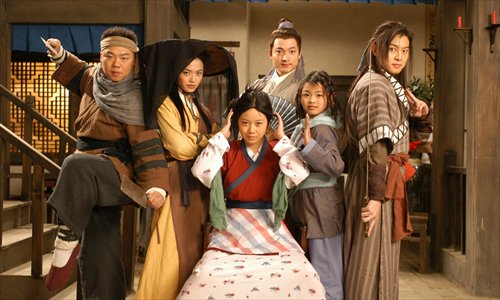HOME >> ARTS
China’s sitcoms lack the bite they need to be successful
By Xiong Yuqing Source:Global Times Published: 2016-1-4 19:28:01

Promotional material for My Own Swordsman. Photo: CFP
This January marks the tenth anniversary of the first episode of the TV series My Own Swordsman. Online many fans expressed surprise at how fast a decade had gone by, while others remarked how the show had earned an irreplaceable position in China's TV history.
While Western sitcoms such as The Big Bang Theory or Modern Family often win big name awards, sitcoms in China have a much harder time getting recognition. Since the sitcom format first appeared on mainland TV in 1994, there have been only a few truly influential Chinese sitcoms. While the genre is still rather young compared to the US or the UK, this lack of successful sitcoms demonstrates the dilemma comedy faces in China. Restricted in their ability to make light of certain subjects, sitcoms lack the bite that is needed to make them truly impactful.
Breaking ground
After earning his master degree at the University of Missouri in the US, multi-talented director and actor Ying Da tried to import sitcoms to China during the early 1990s. At the time, Shanghai TV was having great success with its dubbed version of US sitcom Growing Pains (1985-92) in China, showing that there was certainly a potential audience base for Chinese-made sitcoms in the country.
Cooperating with the late scriptwriter Liang Zuo, Ying started development on I Love My Family, a sitcom about a family of six in Beijing who each had their own distinct backgrounds. Wanting real laughter to accompany the performances, Ying filmed in front of a live studio audience. Except for Ying's other work Chinese Restaurant, no other sitcom in China would ever do so again.
Even though this sitcom is commonly recognized as one of the top sitcoms in China, it was criticized a lot when it first appeared on TV in 1994. Beijing TV stopped airing the show after six episodes because some audiences said it was making fun of retired officials.
After audiences gradually got used to its humor that would cover everything from family life to national policy, the show not only gained a huge following but kicked off the sitcom genre in China. Establishing a TV production studio in 1994, Ying went on to create a number of "Ying-style" sitcoms such as Chinese Restaurant (1998), Xianren Madajie (2000), Dongbei Yijiaren (2001) and The Railway Station (2002). Filmbug.com describes Ying as the "Norman Lear of China" for his contributions.
According to an interview with the Beijing Daily, then general manager of Ying's studio Wang Xiaojing recalled that most of the sitcoms were not huge money-makers.
"In China, sitcoms barely had a future. Audiences found them too low-brow, while TV stations weren't willing to pay high prices for them. In that case, who was willing to make them?" Wang said.
In an interview with the Beijing Daily two decades after the first broadcast of I Love My Family, Ying concluded that the success of I Love My Family was its willingness to be critical of social realities in China. Something that he feels modern comedies lack.
"When we write comedy nowadays, we go soft so we won't hurt anybody. But how can a comedy go without hurting someone?" Ying said.

Promotional material for iPartment Photo: CFP
Ancient sitcoms
Like I Love My Family, most Chinese sitcoms focused on families or workplaces and events taking place in small neighborhoods. Some sitcoms went even more local, producing shows in different dialects for local audiences in different regions of China.
My Own Swordsman's appearance in 2006 was a breath of fresh air for the genre. While period dramas were extremely common in China, My Own Swordsman was a rare period sitcom that centered on different swordsman archetypes found in many martial arts novels. Not really showing off fancy martial arts moves like most swordsman-themed works, My Own Swordsman doesn't solve problems with violence, but with comedy. It often creates a humorous atmosphere by incorporating modern elements into an ancient world, parodying classical scenes from famous movies or shows and even touching on current affairs and popular online memes. Local dialects also make appearances as the sitcom likes to gather people from different regions in China together and feature cultural conflicts. The 81-episode sitcom turned nearly all its actors, and even scriptwriter Ning Caishen, from nobodies into stars.
The most popular sitcom after My Own Swordsman was the iPartment series, which started in 2009. Holding some of the highest audience ratings at the time, the series also launched the careers of its performers. Even the controversy that the show was copying parts of US sitcom Friends couldn't reduce its popularity.
The iPartment series is not the only Chinese show to look overseas for inspiration. Ugly Betty was adapted into Chinese version and the currently hot Diors Man series got its inspiration from German sketch comedy Knallerfrauen.
The rise of the Internet in China, however, has made it more difficult for Chinese studios to outright copy overseas works.
"The market nowadays has become much harsher. In recent years, Chinese audiences have seen a large amount of excellent dramas from the US and the UK, and can easily get various online jokes," an analysis of the sitcom genre from the Beijing News summarizes.
Scriptwriters are now being forced to step up their game. Since modern Chinese audiences now have easy access to shows such as Modern Family, writers can no longer rely on the ignorance of their audiences to get a laugh with used material.
Newspaper headline: Whose laughing now?
Posted in: TV